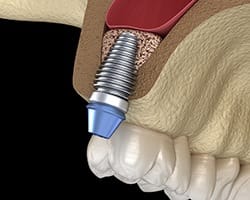Dental Implants — North Dallas, TX
The Most Effective Solution for Tooth Loss

Dental implants are the ultimate in dentistry for the purpose of replacing lost teeth. Millions of people around the world lose teeth because of a lack of good hygiene. However, advancements in dental offices have now made dental implants a very viable and preferred choice for the replacement of missing natural teeth. Unlike the fixed and removable dentures which take support from the nearby healthy teeth, dental implants in North Dallas are directly anchored within the jawbone just like natural teeth.
Why Choose Dental Attraction for Dental Implants?
- #1 In-House Cone Beam Scanner Provided
- #2 Dental Implants Placed In-House
- #3 Experienced and Knowledgeable Implant Dentist
What Are Dental Implants

There are three parts to a dental implant: the implant post, the abutment (connector piece), and the final restoration (the crown, bridge, or denture itself). Once the dental implant post is placed into your jawbone, it mimics the roots of the missing tooth. After it fully integrates with the surrounding jawbone, the connector piece and final restoration are placed. The end result is a beautiful, natural-looking, and comfortable new smile that can potentially last a lifetime.
Replacing missing teeth from the roots up helps dental implants look, feel, and function just like natural teeth. They’re widely considered the gold standard to tooth replacement by both patients and dentists.
The 4-Step Dental Implant Process

Unlike dentures or a dental bridge, getting dental implants is a multistep process. It typically takes several appointments over the course of many months to complete the entire process but one of the best parts of receiving dental implants is that the entire process is completed in-house by Dr. Rouhani. This means you don’t need to worry about getting a referral to see an outside specialist for placement! It’s essential to remember that while they may take more time initially, the long-term benefits and potential to last for decades to come make them well worth the effort!
While everyone who receives dental implants can expect their journeys to be slightly different, the process remains the same. Let’s take a look at how dental implants work in North Dallas.
Initial Dental Implant Consultation

Dr. Rouhani will begin your initial consultation by using a CT Cone Beam Scanner to capture a 360-degree image of your oral cavity and facial structures. Not only will this allow him to more easily view your jawbone, teeth, gums, and other important features, but it will help him to establish a personalized plan and guide that will be used when placing your dental implants.
Should he discover that your jawbone is not strong enough for implants, do not lose hope. You can undergo a preliminary treatment known as bone grafting. This will help to strengthen the weakened areas of your jawbone by inserting grafting materials that will fuse with your existing bone to create a solid foundation for your implants.
Dental Implant Surgery

On the day of your implant surgery, Dr. Rouhani will begin by administering local anesthesia. This will numb the areas of your mouth and ensure you feel no pain whatsoever throughout the procedure. If necessary, you may also be eligible to receive sedation dentistry to calm your nerves and reduce any anxiety you might experience.
Once your implant dentist in North Dallas is satisfied with your current state, he will make one or more small incisions in your gums to expose the jawbone. Carefully placing each implant, he will angle it for maximum support before placing a healing cap over the implant and sending you home to recover.
Dental Implant Osseointegration/Abutment

While recovering at home, the process of osseointegration must occur. This is when the implants fuse with the bone and surrounding tissues. During this time, you will need to follow the instructions provided to you to ensure successful healing. It is also during this time that your finalized restoration will be created by lab technicians. Once you are fully healed, you will return to see Dr. Rouhani who will apply a metal abutment that is designed to connect the implant to the restoration.
Delivery of Dental Implant Restorations

The final step of receiving your dental implants in North Dallas is having the restoration secured into place. If you are looking to replace an entire arch of teeth, it is possible to have a removable or fixed denture; however, if you are only replacing one missing tooth, you will receive a dental crown. Multiple missing teeth require an implant bridge. No matter the type of restoration you need, you can trust that your new teeth will look and feel just like your regular ones. Blending in among your remaining healthy teeth, you’ll enjoy greater confidence, improved functionality, better oral health, and an enhanced aesthetic for a lifetime.
Benefits of Dental Implants

Over 5 million implants are placed every year, and for good reason. While the procedure does have a higher initial cost than traditional tooth replacement options, you’ll find that it’s well worth the cost in the long run thanks to all of the benefits they provide. Below is a list of advantages that you can enjoy with dental implants that traditional dentures or bridges do not provide; keep these points in mind when you’re at our office looking over your dental options.
Day-to-Day Benefits

- Comfort: Dental implants have better stability than other tooth replacements because they fuse with the jawbone itself. As such, they come closer to feeling just like your real teeth than traditional prosthetics; you may even forget that they’re there.
- Improved Diet: A few missing teeth can compromise your ability to easily chew your favorite foods. Thanks to the strength and stability of dental implants, you’ll be able to eat anything you want once again – even chewy or crunchy foods that tend to give denture wearers trouble.
- Easier to Speak: Because dental implants stop your prosthetic teeth from slipping out of place, they make it easier for you to speak without muttering or slurring your words.
- Simple Maintenance: Brushing, flossing, and regular dental checkups are all you need to make sure your dental implants and the prosthetic(s) the support last as long as possible. It’s generally easier to take care of dental implants than dentures, which require specialized cleaning products and have to be thoroughly brushed on every surface.
Health Benefits

- Improved Oral Health: Even though dental implants are placed surgically, they’re actually considered a more conservative solution to missing teeth. Unlike bridges that require us to make alterations to the teeth on either side of a gap or full dentures that can’t be placed unless all the teeth in an arch are removed, implants can be anchored into the jaw without making changes to your remaining natural teeth.
- Improved Oral Hygiene: Since dental implants are so low maintenance, it becomes much easier to protect your mouth from gum disease and other oral health issues by removing plaque and food particles from wherever they’re hiding in your mouth.
- Prevent Bone Loss: Traditional bridges are anchored to natural teeth while dentures rest on the gums. Dental implants, on the other hand, are inserted into the jawbone and thus can provide the much-needed stimulation that is needed to maintain healthy levels of bone density.
Long-Term Benefits

- Long-Term Success: Statistics show that the success rate of dental implants is around 95%, and that remains true even 10 years after placement. You can be confident that the investment you make in implant surgery is one that will pay off in the long run.
- Longevity: The average lifespan of a dental implant is around 30 years or longer. Many patients never have to have their dental implants replaced and go the rest of their lives with their original posts.
- Saving Money: The lack of replacements and special products for maintenance means you’ll save a significant amount of money on implants as the years go by.
Who Can Dental Implants Help?

While there are many solutions for tooth replacement, it’s important to keep in mind that all levels of tooth loss can be resolved via dental implants. Whether you need to have a single tooth replaced or an entire arch, Dr. Rouhani can bring back your full and complete smile. Even better, nearly any patient who is missing teeth and is in generally good health is eligible for dental implants.
Who Is a Good Candidate for Dental Implants?
During your consultation, Dr. Rouhani will look for a few key qualifications that make you a good candidate for dental implants in North Dallas, including:
- Good overall health – Minor surgery is required for dental implants, so you should be healthy enough to undergo this procedure.
- Sufficient jawbone density – After tooth loss, the jawbone often deteriorates to the point where it cannot provide a strong foundation for dental implants. Bone grafting can restore adequate strength to the jawbone.
- Dedication to good oral health and hygiene – Poor oral hygiene, as well as bad habits like smoking, can cause dental implant failure. If you’re going to invest in dental implants, you should be committed to taking care of them.
Even if you don’t meet all of these standards at first, you might still qualify for dental implants! There are certain precautions or procedures that can be performed beforehand, such as bone grafting, to increase the chances of successful treatment.
Once your mouth is ready to receive your new teeth, we can discuss which type of dental implant treatment is right for you. Your implant dentist near Plano can develop a personalized plan for you based on your unique circumstances:
Missing One Tooth

Replacing a single tooth with a dental implant is quite simple; all it takes is one implant post and one dental crown. The implant is placed into the socket where the tooth’s root once was. After the implant has fused to the jawbone, a lifelike crown is secured onto an abutment to complete your smile.
Traditionally, a single missing tooth is replaced with a dental bridge, but this prosthetic requires the two remaining teeth on either end up the gap to be filed down. Over time, this weakens these teeth, leaving them more susceptible to sensitivity and decay. A dental implant can support itself and preserve your natural tooth structure.
Missing Multiple Teeth
If you’re missing several teeth in a row, all you need is one or two implant posts to hold a bridge that seamlessly fills the empty space. Compared to a conventional bridge, an implant bridge restores much more chewing power and resembles your original teeth more closely.
To replace multiple teeth throughout the mouth, we can design a personalized partial denture that is anchored in place with a small number of strategically placed implants.
Missing All Teeth
For patients who are missing all of their teeth, will be soon, or are frustrated with their regular denture, we highly recommend implant dentures. Instead of resting on the gums, a full denture is secured onto an average of six to eight implant posts throughout the jaw. Not only do implant dentures last longer and give you more chewing power, but they also stay in place without the need for messy adhesive.
Missing All Teeth with Low Jawbone Density
If you have been without teeth for some time, your jawbone might be too weak for dental implants. However, you may still be a candidate for All-on-4 dental implants. This solution uses just four implant posts to support a full denture. Because the two posts near the back of the mouth are inserted at a 45-degree angle, patients with low jawbone density might qualify for All-on-4.
Understanding the Cost of Dental Implants

When you’re planning for dental implants, it’s important that you complete a consultation with Dr. Rouhani first and foremost. This meeting helps you confirm the number of teeth you need to replace, the type of restorations used to rebuild your smile, and preparatory procedures you’ll need to receive dental implants in the first place. All these factors influence your total treatment price, which is why the cost of dental implants in North Dallas varies so significantly from one patient to the next. Regardless, dental implants are often seen as the most cost-effective solution for tooth loss because of their longevity, function, and esthetics. Here are a few things you need to know about the price of dental implants.
Preliminary Treatments & Dental Implant Surgery

Each stage of the dental implant process is incorporated into the overall cost of your treatment. From the initial consultation with Dr. Rouhani to the final placement of your restoration, each phase incurs a fee of its own. One advantage of getting your dental implants from our team at Dental Attraction is that, as a highly trained implant dentist in North Dallas, Dr. Rouhani can complete the placement surgery in-house. This saves you the expense and time of having to visit a separate specialist.
Before the surgery, though, many patients have to undergo preliminary treatments to ensure their new teeth will have a healthy foundation. For example, bone grafting may be necessary to strengthen a jaw that has deteriorated after tooth loss. While these procedures increase your chances of dental implant success, they also increase your total treatment costs.
The Parts of Your Dental Implant

Generally, the more teeth you need to replace, the more money you can expect to pay. A full implant denture, for instance, costs more than a single implant that is restored with a crown. The implant post itself, as well the abutment connector, can be made of various materials depending on your unique circumstances. Each of these materials influence the price, and our team will always be transparent about why we have chosen one option over another.
How Dental Implants Can Save You Money

While there are certainly pros and cons to every form of dentistry, dental implants tend to offer more positive aspects than negative. Not only are they far more stable and durable than traditional bridges or dentures, but they are designed to remain in place for decades, if not a lifetime. Your restoration will need to be replaced over time, but the titanium post that mimics your natural tooth structure can last much longer than any other solution designed to replace missing teeth.
Also, you will not find another restorative treatment that works to improve your oral health quite like dental implants can. Because of the structure and placement, they will continue to stimulate your jawbone and keep it from weakening and ultimately aging your facial appearance.
Does My Dental Insurance Cover Dental Implants?

These days, more and more dental insurance companies are beginning to incorporate dental implants into their levels of coverage. However, for some, these restorative solutions still serve as a “want” and not a “need,” which means, depending on your insurance company, you may or may not be covered. The only way to know for sure is to either contact a representative yourself or allow a member of our team to work on your behalf. We proudly work with many of the nation’s leading PPO dental insurance providers.
Making Dental Implants Affordable

If your insurance does agree to cover some of your treatment but not all, or if you don’t have insurance, there are additional payment options available to help you afford dental implants in North Dallas. Third-party financiers CareCredit and Lending Club allow you to split up your costs into monthly installments instead of one up-front payment. In many cases, qualified patients can look forward to very low or even no interest attached!
Advanced Dental Implant Procedures

Have you been told that you need additional treatment before undergoing dental implant procedures in North Dallas? Because a healthy jawbone serves as a solid foundation for dental implants, it is necessary that it have the right amount of density to serve its purpose. Unfortunately, for many individuals with missing teeth, bone resorption occurs, making it difficult to achieve the restored smile they deserve. However, with advanced treatments such as a bone graft or sinus lift, dental implants can once again be a possible solution to replacing missing teeth.
Bone Grafting

A bone graft is often required when missing teeth in North Dallas that are located on the bottom arch are left untreated for a long period of time. Once the bone begins to deteriorate, this type of procedure is necessary to improve the density of the bone and create a more firm, stable foundation.
To complete this process, our team will make a small incision in the gums before placing bone minerals retrieved from another area of your mouth or an alternative source (i.e. cadaver). Once these are put into place, they will begin to fuse with any original bone to rebuild and strengthen.
A typical bone graft can take anywhere from 45-90 minutes and require several months spent recovering. This is necessary to ensure the body does not reject the graft and so the minerals can fuse properly to create stable bone.
Sinus Lifts
If you require dental implants in the upper arch of your mouth but have little bone available in a particular area, a sinus lift can help to remedy this problem. Oftentimes, when a tooth is extracted from the back of the mouth, it can leave behind a gapped area, one that exists between the tooth and maxillary sinuses.
When planning to undergo a sinus lift, Dr. Rouhani will make the same type of incision into the gum as he would a bone graft and place the minerals. Once the surgical area is closed, you will spend the next several months allowing your gums and bone to heal. Over time, the bone will grow up into the floor of your sinuses and create a firm foundation for your future dental implants.
Maintaining & Caring for Your Dental Implants

The long lifespan of dental implants is a major part of why so many patients find them to be an attractive option. If you want your dental implants to last as long as they possibly can, then you need to give them the same level of care that you would your natural teeth. Fortunately, dental implant maintenance is fairly simple and won’t require too much of a change to your regular routine. Below are a few guidelines for protecting your new smile.
Make Oral Hygiene a Priority

Obviously, dental implants and the restorations they support are unaffected by tooth decay. However, the gum tissue supporting the implants can still become infected by the bacteria in your mouth, leading to an infection called peri-implantitis. To keep your implants and the area around them as clean as possible, you should be brushing and flossing thoroughly at least twice a day. Make sure that you’re using a non-abrasive brand of toothpaste that won’t scratch your restoration. Also, consider getting a water flosser or interdental brushes if you have trouble using conventional dental floss.
Eat a Healthy Diet

You can resume a normal diet fairly shortly after you receive dental implants. Remember that sugary or starchy foods can encourage the development of gum disease and other oral health issues. Thus, it is in your best interest to limit your consumption of such foods so that your dental implants have a healthy environment to thrive in. Instead, try to eat fruits and vegetables that are rich in vitamin C, which helps strengthen the gums and protects them against infections.
Break Bad Habits

The following habits carry a high risk of damaging or even breaking dental implants:
- Crunching ice, peppermints, and any other kind of hard food not meant to be chewed
- Using your implants and natural teeth as tools for cutting and opening packages
- Chewing on fingernails and pen tips when nervous
You need to drop these habits as soon as possible to keep your dental implants safe. Dr. Rouhani can give you a few tips to make the process easier, such as keeping sugarless gum on hand when you feel the urge to chew on something.
Protect Your Dental Implants

High-contact sports such as football or martial arts often result in dental implants and natural teeth alike becoming damaged or getting knocked out altogether. Wearing a custom mouthguard while participating in such activities will help keep your smile safe during an accident. It’s also a good idea to get a mouthguard to wear at night if you grind your teeth.
Schedule Regular Dental Checkups

While we’re checking for signs of cavities and gum disease during your regular checkups, we can also make sure that your implants are still in good condition. We can arrange for follow-up treatments if we find issues such implant looseness and bone loss. Call us today to schedule an appointment if it has been at least six months since your last one.
Dental Implants Post-Op Instructions

We’re excited to be able to complete the entire dental implant process right here in our office. Dr. Rouhani has extensive experience performing this procedure, and our whole team is here to ensure that the journey is smooth and comfortable for you, from start to finish—and this includes your recovery! Here’s a brief overview of what you can expect during your healing process, along with several useful tips and post-op instructions you should absolutely keep in mind.
What to Do Directly After Dental Implant Surgery

One of the most important things you can do following your dental implant surgery is to take proper care of the protective blood clot(s) that form over the surgical site(s). Blood clots facilitate the mouth’s healing process, but they can become disturbed if you aren’t careful. Directly after your surgery, you should keep these things in mind:
- Avoid drinking from a straw since the suction can potentially dislodge your blood clots.
- Do not use cigarettes or tobacco products since they impede the body’s healing processes.
- Refrain from poking the implant site(s) with your tongue, fingers, or toothbrush.
Common Side Effects When Recovering from Dental Implant Placement

It’s not always easy to distinguish between normal symptoms and concerning ones, especially if you’ve never undergone surgery before. Feeling some mild discomfort and soreness for the first few days is expected, but you shouldn’t hesitate to give us a call if you’re dealing with persistent or worsening pain. That said, some common post-op side effects you should expect include:
- Minor discomfort that can normally be relieved with over-the-counter or prescribed medicines.
- Swelling in the gums that lasts for a week; this can be alleviated by using a cold compress.
- Intermittent bleeding, which can normally be managed by applying gentle pressure with gauze or a clean cloth on the surgical site.
Your Diet After Dental Implant Surgery

After your procedure, it’s crucial to stick to only soft foods and liquids for a few days, to avoid interfering with the blood clot(s) and to prevent possible irritation. Before your surgery, it’s wise to stock up your pantry with options like:
- Mashed potatoes
- Boiled pasta and rice
- Scrambled eggs
- Yogurt, cheese, and soft dairy products
- Pudding, Jell-O, and milkshakes
- Cold soups and broths
- Protein shakes
Post-Op Health & Oral Hygiene

Osseointegration, or the fusion between your implant post(s) and jawbone, can only occur if your mouth is healthy and free of harmful bacteria. By maintaining proper oral hygiene, you’re setting your implants up for future success. Try practicing these hygiene tips after you’ve received your implants:
- Brush your teeth like normal, but be extra careful and gentle near the implant site(s).
- Rinse your mouth with room-temperature saltwater 3 times a day, especially after your meals. Instead of spitting the water out, let it pour from your mouth into the drain.
- Avoid using mouthwash containing alcohol, since this can trigger discomfort.
What to Do After Your New Teeth Are Attached

After you’ve made a full recovery and your implant posts have successfully fused with your jawbone, it’s time to receive your replacement teeth. Following this, you might feel some mild sensitivity in your gums, but if you do notice any bleeding or swelling, be sure to let us know right away so that we can address it. Otherwise, you’re all set to enjoy your brand-new, fully functional, beautiful smile!
Dental Implant FAQs

Are you thinking about getting dental implants in North Dallas? You want a solution that is permanent and offers full smile functionality, right? If all the benefits that come along with implants sound like the right form of treatment for you, that’s great! At Dental Attraction, our team is eager to restore your smile, but we also want you to feel confident in your decision to move forward with this type of restorative care, which is why we’ve compiled some frequently asked questions for you to review. No matter where you are in the process of identifying and deciding on how to replace your missing teeth, don’t hesitate to contact us with additional inquiries along the way.
Can I Eat What I Want With Dental Implants?
One of the greatest benefits of dental implants is that your artificial teeth will look, feel, and function just like your natural, healthy ones. As a result, you can eat the foods you love and enjoy greater functionality when it comes to speaking and chewing. There are a few things you should keep in mind, though, such as:
- It’s best to cut up larger foods into small pieces for easier consumption
- Avoiding hard, crunchy foods will ensure your artificial and healthy teeth do not become damaged
How Will I Feel After My Dental Implants Are Placed?
After your dental implants are put into place, it is common that you will experience some soreness for several days or even weeks. Dental implant placement is a surgical procedure, so your gums may feel tender for a short while. If we prescribe medication of any kind, make sure to take it as instructed. You may also take an over-the-counter pain reliever as well as use a cold compress to minimize pain and decrease any swelling you might have. With regular care and being mindful of your activity level and getting plenty of rest, your recovery process will be swift and easy.
Is It Possible to Switch to Dental Implants If I Have Dentures?
It is possible to make the switch to dental implants even if you’ve been wearing dentures for years. These permanent restorations are often a welcome change for individuals living with a prosthetic that is removable and requires separate cleaning procedures and regular readjustments and relining. Ultimately, however, it is up to Dr. Rouhani to decide if you are eligible, as the strength of your jawbone will play a vital role in determining if implants are a possibility.
Will My Dental Insurance Cover the Cost of Dental Implants?
Depending on your dental insurance company, this may or may not be possible. Some insurers still believe dental implants are more of a “want” and not a “need,” which is why they will not cover the cost of placement; however, others are coming around to the notion that this restorative treatment is incredibly beneficial and necessary for certain individuals with missing teeth near Addison.
To find out if you are covered for any or all parts of your implant procedure, you should speak to a representative from your insurance company, or you can allow a member of our team to work on your behalf.
